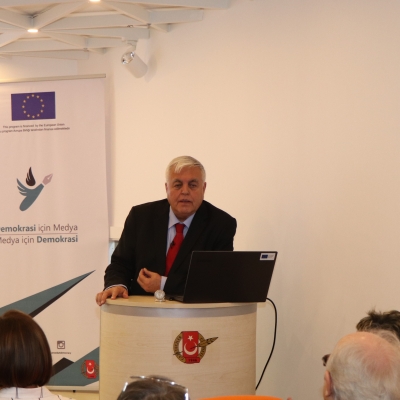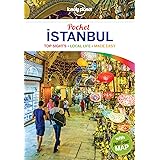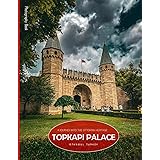SULTAN YAVUZ – Implemented by the Association of Journalists and financed by the European Union (EU) “Democracy for Media/Media for Democracy Programme” hosted Prof. Dr. Hikmet Özdemir at the Press House in Ankara.
In his presentation titled “Atatürk, in War and in Peace” political scientist Öztürk commented that Atatürk was a great communicator starting from his early years as an officer in the army until the end of his life.
Speaking at the opening of the event, M4D Project Coordinator Yusuf Kanlı said, “No one is obliged to be a Kemalist but no one has the right to insult Atatürk. During the difficult times of this country, Atatürk assumed the role of its saviour and re-constructor. I hope we will never need another hero to take on this role.”
Making the opening speech of the event and giving biographical information about Özdemir, M4D Deputy Project Coordinator Seva Ülman mentioned the importance of November as it marks the anniversary of Atatürk’s death:
“Prof. Hikmet Özdemir’s book ‘Atatürk in War and in Peace’ tells the extraordinary tale of our founding father. Özdemir completed a degree in management and administration, later to finish a masters and doctorate degree in Political Science and Public Administration. Özdemir conducted research at University of London with a scholarship from the British Council; state archives in Washington and Georgetown University with a Fulbright scholarship; and also conducted research on the UN Refugee archives.
In addition, he also conducted research in the Presidential archives, TUBITAK and Kocaeli University archives, alongside doing research on the 1915 Armenian Events in the Turkish Historical Society. Özdemir is currently teaching graduate courses at Ankara University War Academy. He is married and has two children. ”
Özdemir, “There were no advertising campaigns or big agencies in the years when Mustafa Kemal was alive”
Prof. Hikmet Özdemir, said that his book “Atatürk in War and in Peace” first talks about a hero, but it also touches on other important topics. According to Özdemir, Atatürk read many books, primarily focusing on history then social sciences, literature and linguistics, fine arts, religions, philosophy, psychology and the basic sciences.
First and foremost a military man, Atatürk was guided by this instinct according to Özdemir “He read because he needed to, and to understand his era. He would internalize the knowledge he gathered and would share it with his surroundings. He began sharing information with the masses ever since his first years as an officer.” According to Özdemir Atatürk’s biggest asset was his powerful ability to communicate: “There were no advertising campaigns or big agencies in the years Mustafa Kemal was alive. He only had himself and the people he needed to reach out to.”
He wrote his first postcard to Rıza Tevfik
Özdemir said that Atatürk communicated with his family and close friends through postcards and letters but also gave great importance to communicating face-to-face which was evident in how he commanded his army. Pointing out the importance of telegraphs, interviews and articles in Atatürk’s life, Özdemir said that Atatürk wrote his first postcard to Rıza Tevfik Böllükbaşı. Mustafa Kemal was 27 years old, said Özdemir, when he sent this postcard expressing his admiration to Rıza Tevfik: “This shows us that Mustafa Kemal was a confident reader.”
Özdemir mentioned the next important text Atatürk wrote was on 29 October 1908 for the İstikbal newspaper in Crete: “After the 1908 Revolution, there was an uprising against the Committee of the Union and Progress Party and Mustafa Kemal succeeded in suppressing it. This letter is very thought provoking, it criticizes the newspaper and talks about its impact on the public. The letter, which he also wrote at the age of 27, serves as a reminder of the duty of the press. It was not something that could be written by someone who merely attended the War Academy, but by someone with intellectual capabilities.”
“Encrypted telegraph played a big role in the national struggle”
Özdemir stated that Atatürk continued to write letters even on the front, and mentioned that Mustafa Kemal had also corresponded with Corinne, with whom he had an emotional relationship. According to Özdemir letters played a very important role in Mustafa Kemal’s life, he mentioned one letter he wrote to İnönü on the night that tied 1937 to 1938: “Mustafa Kemal had written such an elegant letter to İnönü, who was quite sick at the time, that the women of the household told him (İnönü) they hadn’t received the letter yet for fear of him getting worse.”
Alongside sentimental letters, Özdemir stated that Mustafa Kemal had written letters giving place to his political ideas and encrypted telegraphs played a big role in the national struggle. Speaking about the time Atatürk spent outside of Ankara, Özdemir talked about the important communication campaign Atatürk started in 1922-1923. Özdemir said:
“Atatürk went to Bilecik, İzmit, Bursa, Balıkesir-Edremit at that time, the İzmir Economy Congress and the death of his mother took place during this period.
Atatürk then went to Erzurum, Sivas and Kayseri where he made long speeches at provincial halls. These speeches sometimes lasted up to four hours; citizens were of course not used to a leader communicating with them in such a way. For the first time, a leader called on the public to ask questions. This was an enormous communication campaign. Atatürk talked about everything during his travels. How the new regime would be, the reforms that were going to take place… Mustafa Kemal already had already been thinking about these topics, he had prepared mentally for the occasion. He went to the people and told them what he was planning to do. Atatürk gave us a lesson on communication; just imagine no railroads, transport was so limited that sometimes he had to travel on horseback for 36 hours.”
“He conducted the biggest communication campaign of his life in Izmir”
Özdemir stated that Atatürk conducted the biggest communication campaign of his life in İzmir after the Great Offensive, where important journalists and agencies came to İzmir from İstanbul. Mustafa Kemal gave statements to news agencies and reporters of the USA, France and England and talked to them about his plans.
Özdemir also mentioned that Atatürk would keep those he trusted around him, and the interviews he gave to Ruşen Eşref played a very important role in sculpting his public image.
When the Caliphate was abolished in 1924, Özdemir pointed out that Atatürk, who was organizing a campaign in which he met with the press in İzmir, went from city to city to talk about the “Alphabet Reform”.
Özdemir also remarked that Atatürk and his group wrote reports about their travels around the country. The visit of King Edward VIII in 1936 was also an opportunity for Atatürk to conduct an international press campaign remarked Özdemir and added “The Times had used the word Constantinople when referring to Istanbul, following the visit they started to call the city Istanbul.”
Hikmet Özdemir said that Mustafa Kemal Atatürk used communication tools and the press very effectively and remarked “During the years of the National Struggle, the İrade-i Milliye and Hâkimiyet-i Milliyet newspapers were established, then the Anatolian Agency was established in Ankara. He later established the ”Matbuat ve İstihbarat Müdüriyet-i Umumiyesi” which later became the General Directorate of Press and Intelligence. All of this shows the importance Atatürk gave to communication and to the means of communication”.
Source: http://media4democracy.org/en/etkinlik/hikmet-zdemir-atatrk-in-war-and-in-peace





















